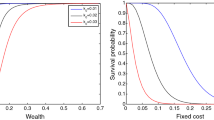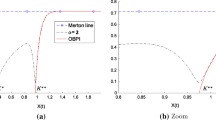Abstract
A well-known regulation on the management of a closed-end mutual fund is that the managers’ account cannot invest in risky assets. This paper studies the impact of this regulation under a given management fee structure such that the cumulative management fee rate is described by a fixed RCLL deterministic increasing function. We conclude that the manager’s welfare is approximately the same whether the regulation exists or not. In the expected utility maximization framework, we explicitly find the optimal investment-consumption plan when it exists, and get a sequence of asymptotic near-optimal investment-consumption plans when an optimal one does not exist.
Similar content being viewed by others
References
Carpenter J (2000) Does option compensation increase managerial risk appetite?. J Financ 55: 2311–2331
Chang HL (2010) Continuous-time principal-agent problems with behavioral preferences, Ph.D thesis, University of Oxford
Cox JC, Huang CF (1989) Optimal consumption and portfolio policies when asset prices follow a diffusion process. J Econ Theory 49: 33–83
Cuoco D, Kaniel R (2011) Equilibrium prices in the presence of delegated portfolio management. J Financ Econ 101: 264–296
Cvitanic J, Wan X, Zhang J (2006) Optimal contracts in continuous-time models. Appl Math Stoch Anal 2006: 1–27
Grinblatt M, Titman S (1989) Mutual fund performance: an analysis of quarterly portfolio holdings. J Business
He H, Pearson ND (1991) Consumption and portfolio policies with incomplete markets and short-sale constraints: the infinite-dimensional case. J Econ Theory 54: 259–304
Hugonnier J, Kaniel R (2010) Mutual fund portfolio choice in the presence of dynamic flows. Math Financ 20: 187–227
Jin H, Xu ZQ, Xun Yu Zhou (2008) A convex stochastic optimization problem arising from portfolio selection. Math Financ 18: 171–183
Karatzas I, Lehoczky JP, Shreve SE (1987) Optimal portfolio and consumption decisions for a small investor on a finite horizon. SIAM J Control Optim 25: 1557–1586
Karatzas I, Lehoczky JP, Shreve SE, Xu GL (1991) Martingale and duality methods for utility maximization in incomplete markets. SIAM J Control Optim 29: 702–730
Karatzas I, Shreve SE (1998) Methods of mathematical finance. Springer, New York
Ou-Yang H (2003) Performance incentive fees: an agency theoretic approach performance incentive fees: an agency theoretic approach. Rev Financ Stud 16: 173–208
Pardoux E, Peng S (1990) Adapted solution of a backward stochastic differential equation. Syst Control Lett 14: 55–61
Pliska SR (1986) A stochastic calculus model of continuous trading: optimal portfolio. Math Oper Res 11: 371–382
Revuz D, Yor M (1991) Continuous Martingales and Brownian motion. Springer, Berlin
Rogers LCG, Williams D (2000) Diffusions, Markov Processes, and Martingales, vol 2: Itô Calculus, 2nd edn. Cambridge University Press, Cambridge
Shreve SE (2004) Stochastic calculus for finance II: continuous-time models. Springer, New York
Starks LT (1987) Performance incentive fees: an agency theoretic approach. J Financ Quant Anal 22: 17–32
Sung J (2005) Optimal contracts under adverse selection and moral hazard: a continuous-time approach. Rev Financ Stud 18: 1021–1073
Author information
Authors and Affiliations
Corresponding author
Rights and permissions
About this article
Cite this article
Li, Y., Yu, B. Portfolio selection of a closed-end mutual fund. Math Meth Oper Res 75, 245–272 (2012). https://doi.org/10.1007/s00186-012-0383-8
Received:
Accepted:
Published:
Issue Date:
DOI: https://doi.org/10.1007/s00186-012-0383-8




